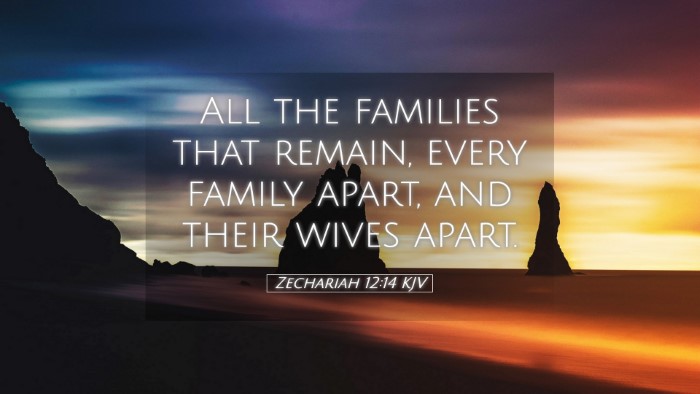Old Testament
Genesis Exodus Leviticus Numbers Deuteronomy Joshua Judges Ruth 1 Samuel 2 Samuel 1 Kings 2 Kings 1 Chronicles 2 Chronicles Ezra Nehemiah Esther Job Psalms Proverbs Ecclesiastes Song of Solomon Isaiah Jeremiah Lamentations Ezekiel Daniel Hosea Joel Amos Obadiah Jonah Micah Nahum Habakkuk Zephaniah Haggai Zechariah MalachiZechariah 12:14
Zechariah 12:14 KJV
All the families that remain, every family apart, and their wives apart.
Zechariah 12:14 Bible Commentary
Commentary on Zechariah 12:14
Verse: "And all the families that remain, every family apart, and their wives apart."
Introduction
This verse concludes a significant prophecy regarding the restoration and renewal of Israel after a period of deep distress and repentance. To fully appreciate its implications, we will draw insights from public domain commentaries, highlighting the historical, theological, and prophetic contexts.
The Context of Zechariah
Zechariah, a prophet of the post-exilic period, speaks to the remnant of Israel who returned from Babylonian captivity. His prophecies often picture the future glory of Zion and the coming Messiah. In this chapter, Zechariah depicts a poignant scene of mourning and repentance, portraying how the people of Israel will turn to God in their sorrow for having pierced the Messiah.
The Families That Remain
Matthew Henry notes that “the families that remain” signifies the faithful remnant that God preserves through trials. This group receives particular attention as they are set apart for a communal act of penitence.
Albert Barnes elaborates that the phrase indicates a completeness of families, emphasizing that every segment of society, from the highest to the lowest, shall acknowledge their sins collectively, yet individually.
Every Family Apart
The mention of “every family apart” implies a need for personal reflection and acknowledgment of sin. Adam Clarke expounds that while they are called to a collective mourning, each family's share of guilt is acknowledged in their separation.
- Individual Responsibility: Every individual within the family is held responsible for their sins, a theme echoed throughout scripture (Romans 14:12).
- Corporate Solidarity: There is an essential balance between personal and collective accountability. The mourning arises from a recognition of their collective failures while also understanding individual contributions to communal sin.
The Role of Wives
The explicit mention of “their wives apart” showcases the significance of families in the act of mourning. Matthew Henry emphasizes that the wives, often overlooked in ancient texts, also engage in the response to this revelatory moment before God. It highlights the familial unit's shared spiritual journey.
- Complementary Role: Just as husbands are responsible for leading, wives are equally called to participate in repentance, indicating a partnership in faith.
- Importance of Family in Worship: The personal and family-level repentance signifies the broader application of faith to domestic life, reinforcing that worship and repentance are integral to communal life.
Theological Implications
This verse poses profound theological truths regarding redemption and repentance.
- Restoration: The act of mourning and repentance serves as a precursor to restoration, resonating deeply with themes of hope throughout the Scriptures (2 Corinthians 7:10).
- Unity in Sorrow: The portrayal of families together in this process signifies that authentic restoration occurs in community, reminding us of the necessity of intercessory communion before God.
Prophetic Context
This verse captures a moment of prophetic vision, as Zechariah anticipates a transformative time for Israel. Albert Barnes suggests that this prophecy foreshadows a great day of the Lord, where collective repentance activates divine intervention.
Moreover, Zechariah’s imagery echoes across the New Testament in relation to Israel's recognition of the Messiah. The acknowledgment of their sin by both family members evokes profound implications for understanding the role of Israel in God’s redemptive plan.
Conclusion
Zechariah 12:14 beckons us to reflect on the importance of recognizing our sins both individually and collectively. The act of families mourning and repenting together underscores the gravity and necessity of communal faith. As we teach and preach from this verse, we are reminded of the restorative actions of God in response to humble hearts.
Inspiring followers of Christ to participate in both personal and corporate repentance remains vital in the life of the Church. As history affirms, the pathway to restoration is paved with humility and the recognition of our sins before a holy God.


